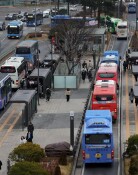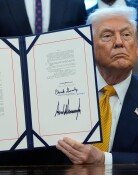Hanbando

A throng gathered yesterday afternoon in front of Seoul Cinema, located in Jongno, Seoul, where the first screening of the movie Hanbando was held. There had been a long hiatus before a single screening had garnered such a crowd in an era when over 50 Korean movies are being produced in only the years first half. Production fees totaling over 10 billion won and rumors that the movie will put an end to the long slump of Korean movies all had a hand in the excitement, but most notably, moviegoers showed their support for director Kang Woo-suk, who has been the Powerman of Chungmuro for nearly 10 years. The pre-screening reception was buoyant.
As actor Cha In-pyo introduced himself as the Ahn Jung-hwan of the movie industry, Kang replied, Actors speak better than they act. He called out actor Cho Jae-hyeon, sitting next to Cha In-pyo, bringing the crowd to laughter by saying, I cast that guy for his apparent knack of acting, but he proved me wrong. If his acting was good, that just shows the competence of my producing.
If constant breakouts of laughter and cheers were what stared the screening of Hanbando, it turned out to be, unfortunately, a movie of unbearable heaviness.
While the underlying theme of nationalism and anti-Japanese sentiment came as no surprise, it wasnt the theme that weighed much too heavily on me, but rather the problem of effectively projecting the theme onto the screen. Having to be reminded by Kang, a director who has produced numerous fun movies during his reign on the Korean movie scene, not to mention the success of Silmido, with over 10 million viewers, that being fun to watch is the one thing a movie must never neglect regardless of its genre, can only be described as baffling.
The movie is set in the near future. After a tidying up of relations between South and Nouth Korea, the historical event of opening up the Gyeongeui Railroad takes place, but thereafter Japan insists its total rights to the management of the railroad based on an alleged treaty signed during the Joseon dynasty in 1907, and threatens to nullify its loans and technology transfer plans should the railroad be opened.
The Korean president (played by Ahn Seong-gi) agrees with a private historians (played by Cho Jae-hyeon) argument that the seal imprinted on the treaty holds no validity, as it was the imprint of a fake royal seal secretly held by Emperor Gojong, and embarks on a quest to find the real royal seal by establishing a committee. In stark contrast to the anti-Japanese president, the prime minister (played by Moon Seong-geun) argues for realistic diplomatic cooperation, while the activities of the secretary of the National Intelligence Service (played by Cha In-pyo) work to add the spice.
The confidence and imagination with which Kang deals with the touchy subject of Korea-Japan relations duly deserves praise. He builds the movie upon two axes, one of the elitist political views largely shared by the leading figures of the well-organized and established regimes, most notably Cheon Wa Dae and the National Intelligence Service in the movie, and the other of views shared by figures outside the established arena, such as that of a private historian. Kangs animating qualities are felt again in huge-scale scenes where the Koreans and Japanese go head-to-head on the brink of all-out marine war.
The fault lies in the small details. During the running time of two hours and a half, actors lines fail to create the drama, and merely scatter here and there, crumbling into pieces of propaganda. It was not so much a problem caused by an overabundance of words, as of one coming from one-dimensional characters in unrealistic situations. The presidents persona was of blatant bigotry. There were no limits to the prime ministers erratic character that went from rational and cool-headed to an irrational conspirer.
The actors lines became more like arguments as to something the crowd could sympathize with, due to the weak plot that shows Korea-Japan relations dependent upon a single royal seal, not to mention unrealistic plot carrying devices. Setting the historical truth aside, shots of Koreas last empress being murdered or the depiction of emperor Gojong werent acute enough.
While the genre of movies is dominated by metaphorical sensibility and not by direct projection, Kang, uniquely, had shown the art of directness in his previous movies. However, Hanbando, definitely does not share its place among those previous works.
Opens July 13. Rated for ages 15 and up.
Mun-Myung Huh angelhuh@donga.com







